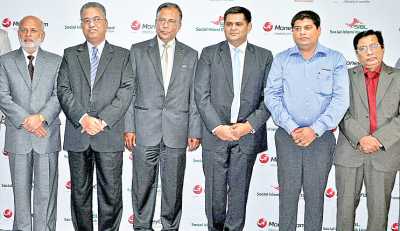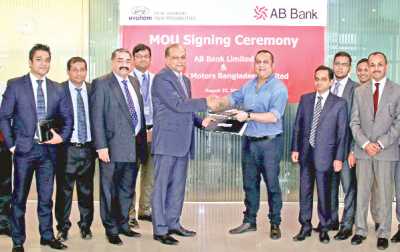Banking
Banks' capital base crosses 10pc requirement
The capital base of banks has swelled well above 10 percent of risk-weighted assets, a regulatory requirement, data from Bangladesh Bank shows.
Capital that banks should hold against their risk-weighted assets rose to Tk 63,694 crore or 10.68 percent at the end of June. The amount was Tk 26,713 crore in December 2009 when Bangladesh introduced Basel-II, an international standard that requires financial institutions to maintain enough cash reserves to cover risks.
“The rise in capital between December 2009 and June 2014 is 139 percent. Banks' ability to absorb losses against risks has strengthened,” BB said in a statement yesterday.
The BB said the quality of banks' assets has improved due to stricter rules in classifying bad loans. Loans will be defaulted if borrowers fail to pay back the money for consecutive three months instead of earlier six months.
Banks' profit before tax and provision surpassed Tk 10,000 crore in the six months through June, compared to Tk 18,000 crore in full-year profits of 2013, according to the statement.
Banks have adequate liquidity and there is no pressure for money in the overnight call money market, the central bank said.
Foreign exchange reserves crossed $22 billion, which is equivalent to seven months' import payments. Healthy reserves have prompted the central bank to raise the Export Development Fund to $1.5 billion from $1.2 billion.
News:Daily Sun/30-Aug-2014
SIBL rewards MoneyGram customers

Social Islami Bank Limited (SIBL), sub-agent of MoneyGram, rewarded the customers of MoneyGram after a month long consumer promotion organised and run during the month of Ramadan.
Customers who received MoneyGram payments from branches of SIBL Ltd during the campaign period won prizes which were handed over to them at a ceremony at the bank’s head office in Dhaka recently, said a press release.
Vishal Krishnan, Regional Manager, Gautam Naithani, Manager Operations of MoneyGram, Md. Shafiqur Rahman, Managing Director, A M M Farhad, Deputy Managing Director of SIBL were present.
AB Bank signs MoU with Hyundai on car loan

AB Bank Limited and Hyundai Motors Bangladesh Limited signed a Memorandum of Understanding (MoU) on car loan facilities.
Under the MoU, AB Bank will facilitate auto loan to the customers with special interest rate to buy any vehicle from Hyundai Motors Bangladesh Limited (HMBL), said a press release.
Shamim Ahmed Chaudhury, President and Managing Director of AB Bank Limited and Shareq Fahim Haque, Managing Director of Hyundai Motors Bangladesh Limited signed the MOU on behalf of the respective sides in Dhaka recently.
Imran Khan, General Manager, Marketing and Customer Care, Md. Nazimul Haque, Assistant Director, Sales, M. Headayatul Islam, Assistant Director, Finance, Mohammad Didarul Alam, Assistant Director, Accounts of Hyundai Motors Bangladesh Limited with Quazi Waseem Ahmed, Senior Executive Vice President, Head of Corporate Finance Division and Structured Finance Division, Syed Mizanur Rahman, Senior Vice President, Head of Retail Banking Division of AB Bank Limited were present on the signing ceremony.
HMBL will offer free after-sales service to all the customers those who will purchase vehicle from HMBL under this facility. HBML will also bear car registration fees for all new car finance applications through AB Bank Ltd.
Electronic fund transfer struggles to get pace
Bangladesh Bank (BB) deputy governor Nazneen Sultana inaugurated the roadshow at a city hotel
Citibank, NA Bangladesh has launched roadshow on Electronic Fund Transfer (EFT) to popularise the modern payment system across Bangladesh.
The roadshow will be comprised of five additional workshops in 2014 in the country's major collection and payment centers located in Bogra, Jessore, Comilla, Mymensingh and Sylhet.
Bangladesh Bank (BB) deputy governor Nazneen Sultana inaugurated the roadshow at a city hotel yesterday.
She said electronic fund transfer system has brought new dimension to the country’s payment system, which is cost-effective, secured and eco-friendly.
But the country’s people are still not aware about this modern system, she said, expecting the Citi initiative would help popularise the system.
However, she hoped the people will be habituated in using the system as it is gaining pace as days passing by. Now electronic fund transactions increased to 55,000 per day from 18,000 a couple years back, she said.
BB General Manager of Payment System Department KM Abdul Wadood said the EFT is yet to reach at satisfactory level since its introduction by the central bank in February 2011. A lot of challenges remain in making people habituated, he said.
Citi Managing Director and Head of Cash Product, Southeast Asia, Noel Saminathan, Citi Country Officer Rashed Maqsood, Head of its Treasury and Trade Solution Moinul Huq and Head of its Corporate and Investment Banking Shams Zaman also spoke at the function.
Later at a panel discussion, Dutch Bangla Bank Deputy Managing Director AKM Shirin said a client has to present physically for completing some formalities. This is one of the reasons the system is not getting momentum, he said.
Another discussant said most of the commercial banks do not have full-fledged online banking systems, holding back many to introduce the system.
The opening event was also attended by senior officials from Bangladesh Bank, Bangladesh Automated Clearing House, managers from scheduled banks and corporate clients of Citi Bangladesh along with nominated distributors and dealers.
The objective of the roadshow is to reduce paper-based processes from the entire payment industry and thus adding more efficiency in the economic system.
Through this initiative, Citi Bangladesh hopes to stimulate further utilisation of EFT system across the country in conjunction with the digital initiatives of the central bank.
As real time gross settlement (RTGS) is expected to go live in 2015, it is expected that a culture of strong electronic payment system across the country will develop, said the Citibank.
Faster settlement cycle along with standardisation in payment information transmission will not only help the clients achieve efficient receivable cycle, but also help the communities across the country to get their goods and services far faster than now, it said.
The system, tagged as Bangladesh Electronic Fund Transfer Network (BFTN), initially allows people to make online money transactions, payment of utility bills through internet, transfer of funds (account to account), payment for goods and services, and facilitate online credit card payments in local currency.
People can later transfer fund from their accounts to the recipients in the country irrespective of their banks, the central bank officials said.
News:Dhaka Tribune/27-Aug-2014
India faces huge job in giving bank accounts to all
NEW DELHI: Premier Narendra Modi has put a pledge to give bank accounts to all Indians on a war footing, but experts say taking banking to rural areas where many people have no identity papers will be a huge challenge, reports AFP.
In developed nations, bank branches are everywhere. But banking services in India leave out nearly half the 1.2 billion population, putting poor people at the mercy of moneylenders who charge usurious interest for emergency loans for sickness or routine purchases such as buying seeds.
“Why are our farmers committing suicide? It’s because they have to take money at huge interest rates from the moneylenders,” Modi declared in his first annual Independence Day speech. Just 145 million of India’s 247 million households have access to a bank account, census figures show. According to the World Bank, 73 percent of farmers have no formal source of credit. While the drive for universal banking access dates back decades, India is still far from its goal.



